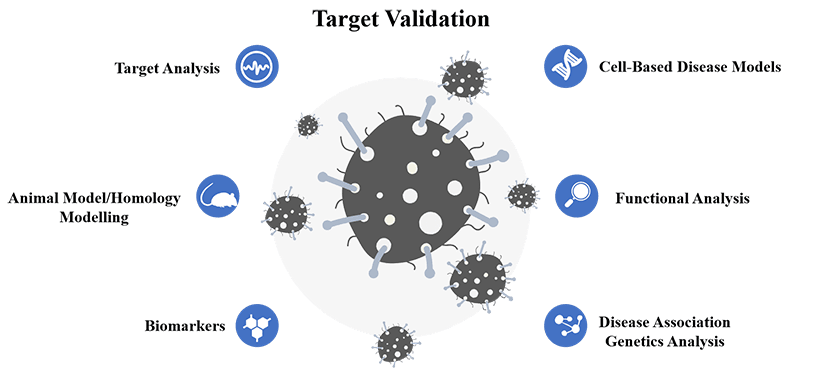Drug Discovery Introduction
Drug discovery is no longer a linear, trial-and-error process. It is a data-driven, multidisciplinary race to translate molecular insight into viable therapies. The following overview maps the critical early phases of discovery, highlighting how emerging tools and strategies are reshaping the path from initial hypothesis to preclinical candidate.
Target Identification and Validation
Successful drug discovery begins with an exact understanding of disease biology. A viable therapeutic target must be central to the disease process and druggable—meaning its biological activity can be modified by a therapeutic molecule, or “hit.” Potential targets are often uncovered through extensive analysis of public literature and available biological databases. Once identified, targets undergo validation to confirm their relevance and feasibility for drug development before advancing to screening.
High Throughput and High Content Screening
With a validated target, the search for starting compounds begins. High Throughput Screening (HTS) enables rapid testing of vast molecular libraries for potential interactions. High Content Screening (HCS) adds an additional layer of insight, producing richer phenotypic data by combining automated microscopy with quantitative analysis. In both cases, tailored assays are designed to evaluate the effectiveness, selectivity, and reproducibility of compound activity while meeting the speed and reliability demands of early-stage discovery.
Hit Identification and Discovery
A hit is any molecule that interacts with the validated target to achieve the intended therapeutic effect. Discovering these hits can involve a variety of strategies, including phenotypic screening, fragment-based discovery, structure-guided design, HCS, and virtual screening. These approaches help researchers move from broad compound libraries to a focused set of promising candidates.
Assay Development and Screening
Assays are the core tools for identifying and refining active compounds. HCS methods, often using in vitro cell models or zebrafish embryos, allow researchers to capture high-resolution biological data at scale. These systems are applied in secondary screening, lead optimization, compound profiling, target validation, ADME studies, and early toxicity assessments, ensuring that only the most viable candidates progress.
Hit-to-Lead (H2L)
The H2L stage narrows the pool of promising compounds to those best suited for further development. Through iterative screening, medicinal chemistry, and targeted refinement, researchers enhance potency, selectivity, and metabolic stability. Approaches such as HTS, affinity-based selection, fragment-based techniques, and target-focused libraries are used to reduce large libraries to a smaller, higher-quality set of leads ready for in vivo testing.
Lead Generation and Optimization
Once a lead compound is identified, optimization work begins. This stage focuses on improving efficacy, reducing toxicity, and enhancing properties like absorption and stability. The goal is to produce candidates with the best chance of translating into safe and effective clinical drugs.
In Vivo and In Vitro Assays
Before moving into clinical trials, candidate compounds must be tested under conditions that reflect living systems. In vitro assays use cell cultures or alternative models like zebrafish, while in vivo studies rely on animal models. These tests assess safety, toxicity, and functional effects, forming the final checkpoint in early-stage drug discovery.

